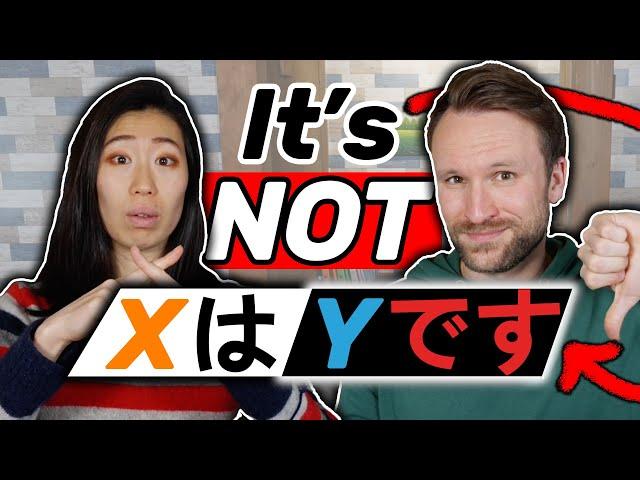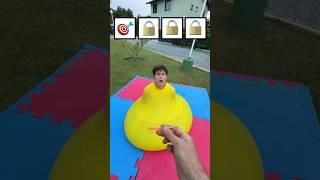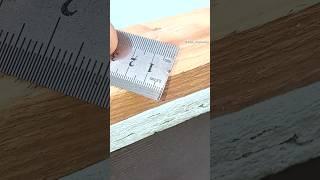
The REAL Most Basic Japanese Sentence Structures
Комментарии:

As a Turkish person, I loved how Japanese is the same as Turkish! No long sentences for simple conversations, no need to specify the person every time you talk, add most things to the end of the verb, etc!
Ответить
You speak like a daycare teacher. Get your testosterone checked.
Ответить
I love how y’all talk super slow. I’m sure intermediates find it slow and annoying, but it’s fantastic for us beginners
Ответить
ぶれいんえくすぱんんでんぐ
Ответить
Cure Dolly and Jay Rubin get all the credit for helping popularize online the change in the way we westerners understand Japanese grammar through our lens. Her videos on the fundamental structure of Japanese and the Zero が changed everything for me. Every sentence in japanese has a subject and a predicate. She's a legend! RIP Cure Dolly 先生!
Ответить
From now on, I will introduce myself using "watashi wa" so that I too can have wind blowing through my hair as I do so.
Ответить
Whoa this is good
Ответить
Im so glad i found this m.f channel
Ответить
So the pronoun+wa particle is always there, but it's just invisible?
Ответить
Can you do a video with Ando さん back story. I feel like he has a very interesting past.
Ответить
Russian is kinda simillar, in the sense, that you can drop the subject and the object in conversation. Though since verbs change based on person and number, it isn't as ambiguous without a context
Ответить
Yeah how about no. My university teachers which all have highest profiency of Japanese teaching since 1985 taught me this rule so its like that! 3 of them are native Japanese.
Ответить
I think you might benefit from the now defunct channel Cure Dolly. This person goes further into detail; adjectives are a bit special, as they have the "is" function already built into them as they are predicate adjectives that stand on their own. (The have a non-past, past and negative form) The reason you need です is to make it polite and there's no real way to make adjectives polite, like adding ます to verbs. So it's not really a matter of being "optional" as it is a matter of wanting to make it polite.
The three basic structures are:
Aは/が Bう (A does B)
Aは/が Bだ(です in polite speech) (A is B)
Aは/が Bい (Bい です in polite speech) (A is B II)

I'm sorry but yuki's introduction is absolutely iconic lmao.
I do not know, nor do I care to know these peasants, but I... I am the great Yuki. Ruler of the 7 kingdoms, conqueror of the deadly seas. Heroes, Villains, Gods and Devils, all crumble in my presence, you foolish mortal.
lmao
Also, the text book version sounds like two spy enemies and one is trying to poison the other with brownies lmao.

does Ando-san need lotion?
Ответить
Funny how Japanese doesn’t like pronouns while native English speakers are obsessed with them lol
I like Japanese more

I'm just happy I was able to follow along and understand the skit the first time through!
Ответить
So is the Y Des structure used in all situations? Even when meeting someone older than you? Or a superior? I always thought this was just used with people younger or around the same age as you.
Ответить
Awesome content! 🎉
Please may you help me please? 🙏
I want to practice my Japanese romaji sentence structure only, to build it up. 🧱
Do you know any workbooks, game apps, videos that only focuses on using romaji to build your sentence structure knowledge? 📝
For now, I just want to speak, converse, and read romaji romanized words.
Thank you so much! ♥

Those “overly dramatic” videos were just ✨perfection✨ 😂😂😂
Ответить
It's so strange to me to hear him say たべる instead of いっただきます when accepting the food
Ответить
This is incredibly fantastic.
I've been learning Japanese for almost 3 years now, and I've dropped my は a while ago now, but it still makes it so much more intelligible to see this video. Also, makes me realised that all those manuals are so terrible... maybe Japanese isn't so hard to learn, it's just that the available official material is so bad that it's super hard to learn with it?

It's like how a command like "go" is a full sentence in English with the subject being an understood (but unsaid) "you."
Ответить
Okay, I came here to learn something about Japanese, and I knew something new about English. It always seemed to me that in English you can throw out all unnecessary words from a sentence just like in Japanese or Russian.
And in Russian, you can put words in a sentence in almost any order. You can make the same sentence in such a way that it must have a pronoun in it, or you can make it in such a way that you have to drop everything from it. If you are in a state of excitement or desire to do something, you will start the sentence with a verb. If you are calm, most often with a pronoun. Tired, you'll start with a noun or the shortest form of a verb. The context of your conversation suggests the use of adjectives - adjectives will come first in the sentence. You can tell by the order of the words what kind of person you are talking to, his priorities, his mood, even if he tries to hide it all with his body language or tone of voice.
The worst thing that can happen if you choose a random word order is that you'll sound like you're playing a Shakespearean role or joking or playing a medieval Russian. So for a native Russian speaker, Master Yoda speaks in literary dramatic language, but just with the strange intonations of a jolly old man.

English using commands: "Hold my beer"
Spanish: "My beer has been on the floor"
Japanese: "My beer was born in a secret underground bunker below the deepest point of the ocean"

Really very easy to understand when u put in this way. Thank you so much for this informative video 💐💐
Ответить
The fact that I can laugh and learn makes learning so much easier and more fun. I find myself on almost 4 hours a day of japanese learning including music now. I'm hoping to be N5 by the end of July.
Ответить
I'm not going to lie all of this stuff is confusing me I just want to learn the basics so I can somewhat understand the conversation and then improve from there all this Jibber jabbers a little confusing
Ответить
This is why I love language study in general. It just gets deep.
Ответить
I first watched this a few weeks ago, and I came back to see how much better I could understand. And yah, improvement is being made :D
Ответить
People who told me duolingo is shit are stupid. It started me of with Y desu instead of Kore wa y desu at least.
Ответить
When broken down and translated literally it sounds really funny but its also super efficient.
Ответить
technically it is still the standard sentence of “XはYです” but you learn to drop things from mutual contextual understanding between speaker and listener.
even in english there are times where certain things are dropped in casual speech from mutual contextual understanding. example: “Shall we?” when getting up from a seat. Understood that it is “shall we get moving to the next place?” or something similar.
Japanese is more convenient with its grammar structure utilizing particle pairing that you can remove chunks of the full sentence and still carry mutual understanding that it was actually still a part of the sentence just unspoken.
same example as above, the japanese could be: “行く?” or “行こう?” or even “じゃ”
similar to that last one in english “Well then” or just “well” or “then” even “Let's” is enough for understanding. but yeah, Let's is Let Us.

dude i would pay to take classes w u what in the world thank u sm
Ответить
Wowowow this is really good information! I'll definitely be watching your channel as often as I can because I learned a LOT from just this video alone! You're the person that puts the pieces of the puzzle together. Thank you so much.
Ответить
I feel like I need to give 100 likes to this video!
Ответить
Subbed, Good Stuff
Ответить
So you're saying the textbook form would sound like Zucc saying: Hello my fellow humans. I just drank a glass of water as we humans usually do throughout the day.
Ответить
Watched.
Thx for the video ~

fire content, been learning from the ground up, currently at your chapter 5 lesson, great stuff man!
Ответить
i can't express how much i needed this. and it makes so much sense when explained in this way. thank you so much!
Ответить
I think translate ですto it’s is a error, first you don’t need to use ですeverytime, you can use for example, 私は山田 and how you will translate without です. です it’s just politeness.
Ответить
This is pretty similar to Literary Chinese.
Ответить
Knew where this was headed - and I've pretty much observed the same myself.
Well, は is the topic particle, right? The way I always thought about it, is that there is this kind of "variable" (spot the programmer) that gets filled when you use it. And by default it is filled with either "I", "You" or "That thing" (which you know from context)
This is actually not quite true, because context can override this without using は, and が can also override it sometimes, but it got me a basic understanding.

from what i learned elsewhere, は and が differ in what the emphasis is placed on. one refers to the preceeding word and the other focuses on the succeeding word.
Ответить
I really like these bite-sized lessons
Ответить

























